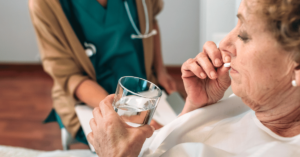Using Non-Pharmacological Therapies To Help People With Dementia Sleep (Part 2: non-pharmacological sleep remedies)
The Faculty of Rehabilitation Medicine at the University of Alberta has completed a study called Understanding healthcare provider barriers to prescribing and recommending non-pharmacological sleep interventions for persons diagnosed with dementia. It’s important to note that sleeplessness, which speeds up dementia in the brain for adults with Alzheimer’s and other dementias (AOD), is not a normal sign of aging, and also affects caregivers. The next step after using the study to promote awareness is using it as a tool for sleep-problem solutions. Listed in the study is www.sleep-dementia-resources.ualberta.ca, a website designed to help caregivers understand and use non-pharmacological sleep interventions. These are Bright-Light Therapy, Daytime Activity, Sleep Hygiene, and Passive Body Heating.
Bright-Light Therapy
Bright lights such as sunshine and daylight signal the brain to be alert and awake. Dim light signals the brain to produce a hormone called melatonin, which controls the sleep and wake cycle. Getting enough bright light during the day signifies that when lights are dim and a room is dark the brain will produce melatonin, to signal sleep. The more natural daylight a brain receives during the day, the more it is receptive to producing melatonin when darkness falls. If daylight is grey and low, caregivers can buy natural light lamps to help them produce more light for persons with AOD.
Daytime Activity
Doing activities and exercising during the day helps persons with AOD become tired by bedtime. Being active helps with alertness, digestion, thinking, and pain and stiffness in the body. When a person with AOD has a full day of activity such as going for walks, having conversation, going for a drive, listening to music and doing chores. The person becomes tired mentally and physically enough that the brain needs rest and has an easier time shutting off. Caregivers should avoid daytime naps or at least decrease the number of naps.
Sleep Hygiene
A sleep routine, or getting ready for sleep, is extremely important to the brain and body. When you do activities that suggest you are ready to go to bed and to sleep. Your brain becomes used to associating the activities with sleeping. Avoiding spicy food, alcohol, caffeine, and too many liquids before bedtime helps greatly. Bathing and brushing teeth can signal the readiness for bed. And a fixed time for bed is extremely important as it trains the brain and body to become tired at the right time.
Passive Body Heating
Daytime and nighttime temperatures can signal wake and sleep – a human body associates warmer temperature with daytime, and cooler temperature with nighttime. Depending on the climate we live in, temperatures may vary at nighttime and this can affect sleep. It is important to artificially create the right body temperature for sleep – to allow the body to feel a comfortable warmth, through use of a warm bath and a heat blanket, and then take the heat source away to signal the brain to fall asleep, and allow the body to naturally drop in temperature as it does when fully asleep. Temperatures that are too warm or too cold will affect falling asleep and keeping asleep.
Try these non-pharmacological remedies and let us know if they’re working for you!
Karen 🙂
Karen Tyrell, CDP, CPCA
Personalized Dementia Solutions
Personalized Dementia Solutions
www.DementiaSolutions.ca




2 Responses
I’m a trained shrink and iphone hypnosis app hypnotherapist myself and I think these folks have done a solid job. I especially appreciated the ability to control the gain on the voice and the music separately. The background music seemed to set just the right mood and the hypnotic induction and instructions were very professional. My only advice would be that as time goes by, they add additional hypnotic scripts for a variety of life issues.
Thanks for your comment Shazia. I too know of clinical hypnotherapists who do an amazing service especially for those in early stages. Sadly, this type of therapy is not commonly known. Perhaps over time, more people will share their positive experiences so that others may feel more comfortable. Stay in touch! Karen 🙂